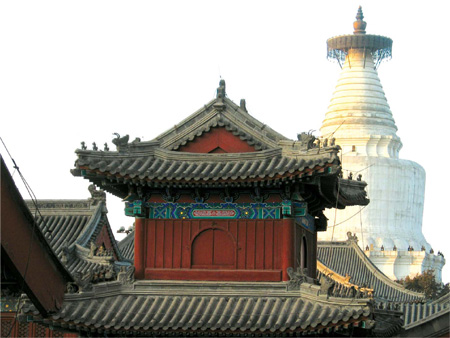
Don't lose the White Pagoda (Baita Si). The Tibetan Lamaist temple, resembling a giant white inverted funnel, built under the auspices of Kublai Khan in 1276, shines like the pole star under the glistening sun. You can let yourself go in the hutong around it, twisting and twining around the siheyuan with serpentine abandon, and yet not feel lost. The white peak of the Pagoda, once the highest point in the Yuan Dynasty (1271-1368) imperial capital of Dadu, now serves as a beacon to the tourists who might have fallen off the map.
As you walk out the north-east exit of Fuchengmen and head east, your own reflection, broken into pieces on glass shapes encased behind glass windows stare back at you. These are shops specializing in making trophies. A structure with three arched doorways on its red wall leads to the White Pagoda courtyard. A golden statue of the laughing Buddha sits pretty inside the sanctum, neatly cordoned off by a fence. You can either spend hours looking at the exhibits in the museum, the series of Tibetan Buddhas on display and the etchings of monuments from all across the country, or take the narrow Baitasi Dongjiadao, that runs along the outer wall of the compound and walk on. Watch your step as you go. Siheyuan-dwellers seem to keep their belongings - cupboards, shoe-racks, quilts and pets - outside their homes. Watch out for waste being combusted in giant vats.